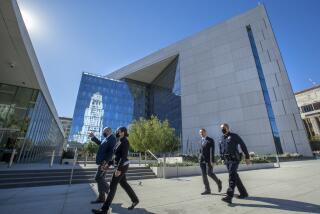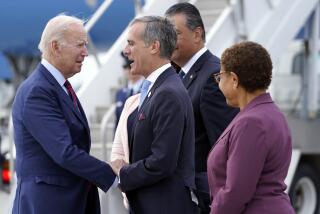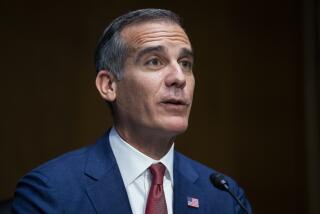Analysis: Garcetti, like other big-city mayors, must balance agenda, police actions
- Share via
From his windows Monday, Eric Garcetti could see the same scene that greeted him Sunday: Protesters gathered outside his home demanding that the mayor fire LAPD Chief Charlie Beck and hold public hearings into the shooting death of a mentally ill man in South Los Angeles.
Their numbers were very small, true, but for Garcetti they were a reminder that reality doesn’t always conform to the wishes of the politically ambitious.
Garcetti came into office in 2013 as the earnest proprietor of a massive to-do list of would-be civic improvements: filling potholes, picking up trash and creating jobs. He has proposed billions in spending for earthquake preparation, worked to draw tech types here from across the country, and espoused a data-driven approach to measuring the city’s successes and failures.
But this week, he was caught in the debate that has confounded Los Angeles repeatedly over the years: whether the police force is an occupying army, as it long was; a reliable ally for the community, as it has tried to become; or something in between.
And its mayor was in the same spot where mayors have long been in this city: walking the knife’s edge to maintain relations with a Police Department whose loyalty he needs and a community whose loyalty he wants.
In the days leading to Tuesday’s expected verdict by the city Police Commission about the August shooting of Ezell Ford, Garcetti expressed confidence that a hard-won resilience, forged by past police travails, would prevent the upheaval that has marred other cities reeling from police controversies in the last year.
“It is a very tense moment in the country,” Garcetti said last week during an appearance at UCLA. But, he said, Los Angeles had its act together. “It is not the actions that are taken, it is the reaction of a department that defines a city.”
Just as the reactions of elected officials go a long way to defining them.
Garcetti came into office as one of a wave of new Democratic mayors offering moderate-to-liberal solutions honed by a bloodless reliance on data. (At UCLA, he whipped out his smartphone to show off how he could monitor response times and virtually anything else measurable.)
His election, coming as the city struggled to recover from the recession, focused on the budget, pension reform, renewing neighborhoods and defying the influence of some powerful unions.
“Let’s do the basics better, like answering phones, filling potholes and picking up trash. Because doing the basics right makes life better for families and makes growth possible,” he said in one campaign ad.
It’s perhaps a measure of success — and the work done by police and community alike — that Los Angeles has escaped some of the violence that has hit elsewhere in recent months.
New York, where Mayor Bill de Blasio campaigned for office against the NYPD’s stop-and-frisk policies, experienced widespread protests last winter that eased only in the fraught aftermath of the intentional killing of two police officers. De Blasio’s relations with the department were so curdled by then that officers turned their backs to him as he arrived at the hospital immediately after the shooting.
The city convulsed over the death of Eric Garner, an unarmed man who died after being restrained by officers. And on Monday, De Blasio was reacting to a new jolt, the suicide of another young man apparently unable to cope after he had been jailed for three years, without a trial, for allegedly stealing a backpack.
Baltimore Mayor Stephanie Rawlings-Blake has been caught between protesters, police and the broader community after riots tore through her city in the days following the death of a black man, Freddie Gray, after he sustained injuries in police custody. Charges since have been brought against six Baltimore police officers.
During his UCLA appearance, Garcetti recounted a conversation with Rawlings-Blake, whom he described as a longtime friend, when disturbances broke out last year in Ferguson, Mo., after a police shooting there. The Baltimore mayor had insisted, Garcetti said, that violence would not mar her city.
It didn’t happen that way, of course, to the detriment of Baltimore’s peace and Rawlings-Blake’s political reputation. De Blasio, too, has gone from liberal it-boy to stumbling mayor as his agenda was sideswiped by police fights.
Garcetti insisted that Los Angeles’ work in the wake of its police controversies would pay a peace dividend to the city. And though he wasn’t crass enough to say so, that would benefit his political ambitions, which are widely believed to extend beyond City Hall.
On Monday he was playing it carefully, acknowledging protesters’ concerns about the Ezell Ford case, while not ceding ground entirely.
He announced that he had called Ford’s mother to express condolences and said he hoped to meet with her soon. Hours later, in what could be seen as a small effort to yank his agenda back to the forefront, his office announced winners of a technology competition meant to find solutions for water conservation, transportation and other civic needs — the kind of thing he promised to do when elected.
Twitter: @cathleendecker
More to Read
Sign up for Essential California
The most important California stories and recommendations in your inbox every morning.
You may occasionally receive promotional content from the Los Angeles Times.





![Vista, California-Apri 2, 2025-Hours after undergoing dental surgery a 9-year-old girl was found unresponsive in her home, officials are investigating what caused her death. On March 18, Silvanna Moreno was placed under anesthesia for a dental surgery at Dreamtime Dentistry, a dental facility that "strive[s] to be the premier office for sedation dentistry in Vitsa, CA. (Google Maps)](https://ca-times.brightspotcdn.com/dims4/default/07a58b2/2147483647/strip/true/crop/2016x1344+29+0/resize/840x560!/quality/75/?url=https%3A%2F%2Fcalifornia-times-brightspot.s3.amazonaws.com%2F78%2Ffd%2F9bbf9b62489fa209f9c67df2e472%2Fla-me-dreamtime-dentist-01.jpg)








